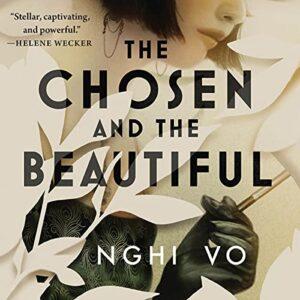
In this retelling of The Great Gatsby, Jordan Baker narrates the story from the perspective of a queer, Asian woman adopted by a white couple. Although she runs in elite circles with Daisy and Tom, she is treated as an exotic pet, left on the outside even when a part of their group.
Calling Jordan adopted brings up a problematic situation of white saviors. When the Bakers found her in Vietnam, they claimed she had been wandering alone. Wanting to save her from the violent environment, they simply took her back with them to Kentucky. They never even inquired about her parents' whereabouts.
Throughout the story, Jordan encounters racism at every turn. She endures questions like, "Where are you from?" and when she answers Kentucky, it makes white people uncomfortable. Even in her own group with Daisy and Tom, Tom goes off on racist rants against Asians but tells Jordan she's "one of the good ones."
Jordan also encounters that feeling of Otherness amid people who look like her. As the novel unfolds, she interacts with other Asian characters who ask her the same thing: "Where are you from?" When she tells them Kentucky, there's a disappointed reaction to her seeing herself as American. She embodies the duality of neither belonging among white Americans nor among the Asian community. As she says toward the end of the novel: "Alone I was a charming anomaly, with Kai I was a dangerous conspiracy."
In certain ways, Jordan uses her Otherness to occupy a space not afforded to her gender at this time in history. As she is an outsider in elite white society, she is not expected to be a proper lady or behave in predefined proprieties. She takes greater freedoms that Daisy does not feel she can.
Personally, when I read The Great Gatsby in high school, I hated it. I hated all the characters and thought they were all the worst possible human beings. In this retelling through Jordan's perspective, it's easier to see the nuance of what makes these characters so terrible. For Daisy especially, as it's clear throughout that Jordan is in love with her, there's much more sympathy toward her position in a society that puts so much pressure on young, upper-class women.
All the queer subtext from the original novel gets brought to the forefront. Jordan, openly bisexual, has relationships with whoever strikes her fancy, including Nick, who is also bisexual. But Nick isn't as open or accepting about his sexuality. Jordan tries to pull out of him his feelings for Gatsby but it makes Nick angry and she doesn't bring it up again. Daisy and Jordan have an unspoken desire for each other that never becomes actualized.
The magic woven throughout the story brings another interesting layer to the original book. Jordan has special powers that appear to be an inheritance from her Vietnamese bloodline. She meets others like herself who have the same power, but she tries to deny this part of herself. It plays into her insecurities and how she fights against her Otherness in every way.
Where the classic novel ends with the eyes of Doctor T. J. Eckleburg looking upon Daisy's crime, Jordan confronts the billboard and brings it to life with her magic powers to learn what they saw. She realizes what happened and reluctantly comes to Daisy's rescue.
SPOILERS BEGINVo also creates mindblowing twists with the added layer of magic. Jay Gatsby made a deal with the devil and when he fails to deliver his end of the deal, his life is taken. And in the end, Nick turns out to be a paper being of Jordan's making with her magical powers. With all these strings that tethered her to New York gone, Jordan is finally free to go to Shanghai and find out where she really belongs.
SPOILERS ENDAt times the pacing is slow, but overall, it's a compelling read that really brings the original story to another level. I listened to the audiobook, so the narrator, Natalie Naudus, brings it to life.
Content warning: racism
